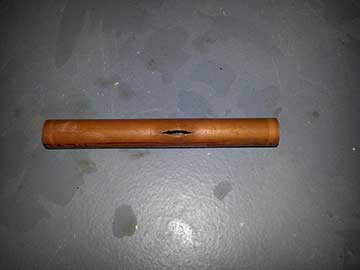
Living here in the Atlanta, Georgia area we are so very fortunate to experience mild winters. That means that we do get some nights of freezing temperature in the winter and as a result – our plumbers do get calls to repair burst pipes.
If you think about the kind of damage that burst pipes can cause, you can quickly realize how expensive the cleanup and fix could become. The water from that leak could damage walls, ceilings, flooring, furniture, etc.
In fact, the Insurance Institute for Business and Home Safety reports that the damage can run as high as $5,000! When you compare that expense to the cost of pipe insulation (about .50 per linear foot) and drywall repair after the pipes have been insulated then it makes sense to be preventive versus risking burst pipes due to freezing temperatures.
So, let us tell you the best advice we know on how to prevent your water pipes from freezing so that you don’t have to go through the expensive and time consuming task of cleaning up and replacing your stuff.
Here’s Why Pipes Burst When They Freeze
First things first, let’s talk about how and why pipes freeze in the first place.
Your water pipes will have water left in them even if you haven’t used them for awhile. If these pipes are not properly insulated, when the temperature gets to freezing or below – that water will freeze. And when it does, it expands taking up more space in the pipe than when it was liquid. The pressue in that pipe can go from 40 lbs per square inch up to 40,000 psi – that’s a tremendous amount of pressure and as a result – the pipe bursts.
What is the minimum temperature to keep pipes from freezing?
It’s recommended to keep the temperature in your home no lower than 55 degrees fahrenheit to prevent your pipes from freezing.
Which pipes are most vulnerable to freezing?
The majority of frozen pipes that we work on are located on outer walls that have not been insulated. An example would be walls of your garage, your attic or your basement.
Most homes don’t have central heat or any heating system in their garage so keeping your garage at the recommended minimum of 55 degrees fahrenheit could be difficult.
Of course, the best recommendation is to insulate those walls and insulate your pipes. But, as a temporary solution we can advise you to keep your garage doors closed and open the door from the garage into your home to heat up your garage. Of course, you can also plug in an electric space heater but we caution you to be very careful where you place this heater and to not leave the heater on overnight or unattended for too long.
We would recommend space heaters with timers, just in case you forget to turn it off.
It’s true that the space heaters today have built in safety features but they still house elements that can get hot enough to start a fire and most garages are filled with lots of things that can easily fuel a fire.
5 Safety Tips On Best Way To Use A Space Heater
- Use a heater that’s been evaluated by a nationally recognized laboratory like the Underwriters Laboratories. You would see the UL symbol on the heater.
- Use a heater that has safety features such as a timer and automatically turns off if it falls over.
- Position the heater so that it is at least 3 feet away from the wall or any other objects.
- Even though the heater may have a timer – ALWAYS turn off the heater when not in use, when you leave the home and at night when you go to bed.
- Never use an extension cord for your space heater – plug it in directly into the wall socket.
How To Prevent Your Pipes From Freezing
If the weather reports temperatures will hit 20 degrees or lower – this is your alert to take the following steps to keep your pipes from freezing and eventually bursting.
- As we said earlier – keep your garage doors closed to retain as much heat as you can inside your garage.
- Open the kitchen and bathroom cabinets (in case there are any pipes behind those cabinets).
- Turn a faucet on so that water drips (leave it on while the temperature is 20 degrees or lower). This forces water to run through the pipes and helps to prevent sitting water from freezing.
- Keep your thermostat at the same temperature during the day and night.
- Any insulation that you can add to your home, in the walls, wrapping pipes, windows, cracks in doors, etc. will help to prevent your water pipes from bursting and creating and expensive mess.
Can sewer pipes freeze as well?
Yes, sewer pipes can freeze if they are not property insulated or poorly installed. It’s not as common because sewer pipes are often installed with proper insulation but it does happen.
In conclusion, preventing your water pipes from freezing may cost you a few dollars initially, but when you compare it to the amount that it would cost you if you ignored the issue – it seems like a minor expense.
If you are having problems with your water pipes freezing or have questions, call Atlantis Plumbing – the Atlanta, Georgia plumbers of choice at 770-505-8570.